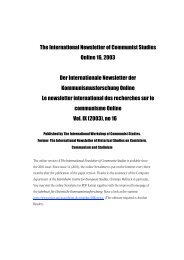VOL. XVI (2010), NO 23 - The International Newsletter of Communist ...
VOL. XVI (2010), NO 23 - The International Newsletter of Communist ...
VOL. XVI (2010), NO 23 - The International Newsletter of Communist ...
Erfolgreiche ePaper selbst erstellen
Machen Sie aus Ihren PDF Publikationen ein blätterbares Flipbook mit unserer einzigartigen Google optimierten e-Paper Software.
<strong>The</strong> <strong>International</strong> <strong>Newsletter</strong> <strong>of</strong> <strong>Communist</strong> Studies Online <strong>XVI</strong> (<strong>2010</strong>), no. <strong>23</strong> 13<br />
the other countries <strong>of</strong> the CPLP [Community <strong>of</strong> Countries <strong>of</strong> Portuguese Language]. From<br />
the Utopia Generations to the Duty <strong>of</strong> Memory, it matters to reinforce the Ideals and<br />
Principles that must guide Citizenship and Human Rights in our democratic societies."<br />
See http://www.fmsoares.pt/aeb/dossier15/default.asp for more information.<br />
Recently Published in French Language: A Guide to the Comintern Archives.<br />
<strong>The</strong> University <strong>of</strong> Burgundy released a guide presenting the Archives <strong>of</strong> the <strong>Communist</strong><br />
<strong>International</strong> hosted by RGASPI in Moscow. This vade mecum is especially orientated to be<br />
a pathfinder to the digitised fonds <strong>of</strong> the Comintern Archives within the framework <strong>of</strong> the<br />
European and <strong>International</strong> INCOMKA project ("<strong>The</strong> <strong>International</strong> Committee for the<br />
Digitisation <strong>of</strong> the Comintern Archives") which may be consulted in France at the National<br />
Archives (Paris and Fontainebleau) and the Institute <strong>of</strong> Contemporary History at the<br />
University <strong>of</strong> Burgundy. In Germany these digitals (about 1.3 mio. pages) can be consulted<br />
by every German resident within the framework <strong>of</strong> a national licence agreement between the<br />
Deutsche Forschungsgemeinschaft (DFG) and the Comintern Online database<br />
(http://www.comintern-online.com/). <strong>The</strong> book contains a foreword by the general director <strong>of</strong><br />
the French National Archives, Martine de Boisdeffre, an introduction by Christian Oppetit<br />
from the aforementioned archive, and an extensive article summing up the history <strong>of</strong> the<br />
<strong>Communist</strong> <strong>International</strong> by Serge Wolikow. <strong>The</strong> short description <strong>of</strong> the individual fonds and<br />
"opisi" gives details about the description level, the period covered, the volume, the RGASPI<br />
and INCOMKA specifications, some characteristics <strong>of</strong> the provenance history and the<br />
organisational structure, the outlined content, the languages used in the documents, and the<br />
existing finding aids.<br />
Serge Wolikow, Alexandre Courban, David François, Christian Oppetit: Guide des archives<br />
de l'<strong>International</strong>e communiste, Paris-Dijon, Archives nationales, Maison des sciences de<br />
l'homme, 2009. 336 p. ISBN: 978-2-86000-338-4.<br />
<strong>The</strong> book may be ordered for the price <strong>of</strong> 20 euro at: Université de Bourgogne: UMR CNRS<br />
Ub 5605/IHC, 2, boulevard Gabriel, 21000 Dijon, France.<br />
Neue Online-Ausstellung würdigt politische Häftlinge des KZ Oranienburg.<br />
In Zusammenarbeit mit der Stiftung Brandenburgische Gedenkstätten und den<br />
Landesarchiven von Brandenburg und Berlin sowie dem Bundesarchiv haben Studierende<br />
eines Projektkurses des Otto-Suhr-Instituts für Politikwissenschaft an der Freien Universität<br />
Berlin eine Internet-Ausstellung mit dem Titel „Die politischen Häftlinge des<br />
Konzentrationslagers Oranienburg“ erstellt. An dem von den Pr<strong>of</strong>essoren Siegfried Mielke<br />
und Günter Morsch geleiteten Projekt haben 20 Studierende und Wissenschaftler rund zwei<br />
Jahre lang gearbeitet. Die Ausstellung kann ab s<strong>of</strong>ort auf der Website der<br />
Gedenkstättenstiftung unter http://www.stiftung-bg.de/kz-oranienburg/ besucht werden.<br />
Den narrativen Rahmen dieser Ausstellung, in deren Mittelpunkt mehr als 200 Biografien<br />
politischer Häftlinge stehen, bildet die Schrift „Oranienburg“ (1934) des ehemaligen<br />
Reichstagsabgeordneten Gerhart Seger. Durch seinen Bericht, den er nach seiner Flucht<br />
aus dem Lager veröffentlichte, wurde das Wort „Oranienburg“ international zum Synonym für<br />
den Terror der Nationalsozialisten. Neben der biografischen Darstellung prominenter<br />
politischer Häftlinge wie Friedrich Ebert jr., Ernst Heilmann, Kurt Magnus und Erich Mühsam














